
Voices of Participating Students
JD Pilot Program Student Report (5 participating students in the 2023 academic year)
Questionnaire to JD Pilot Program Students
Questionnaire Results from 8 Pilot Program Participants in the 2022 Academic Years
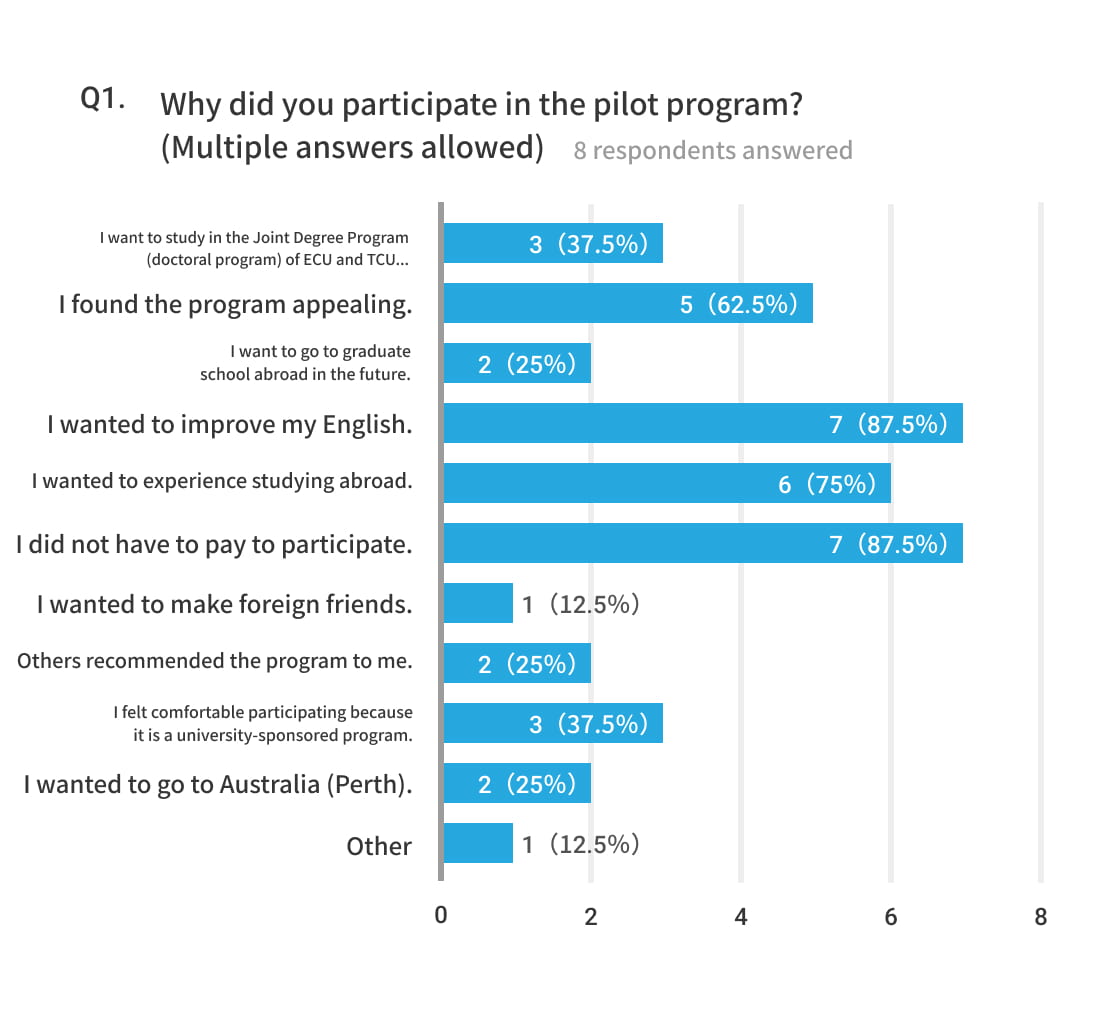
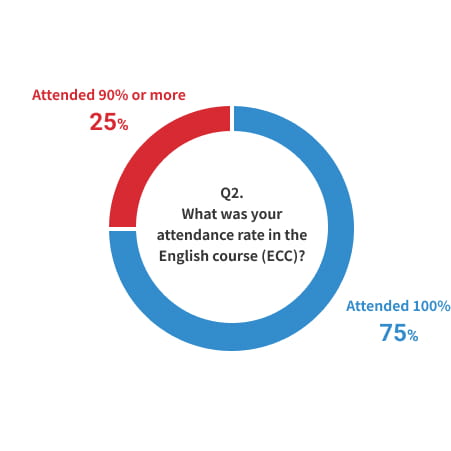
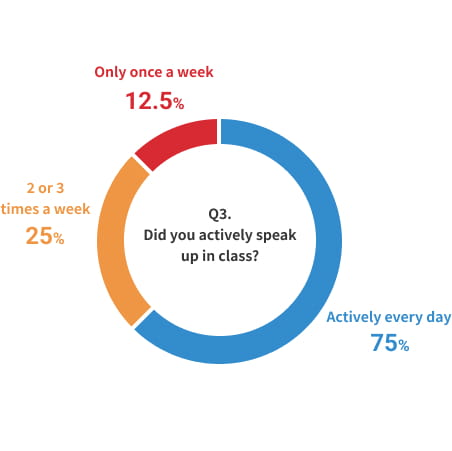
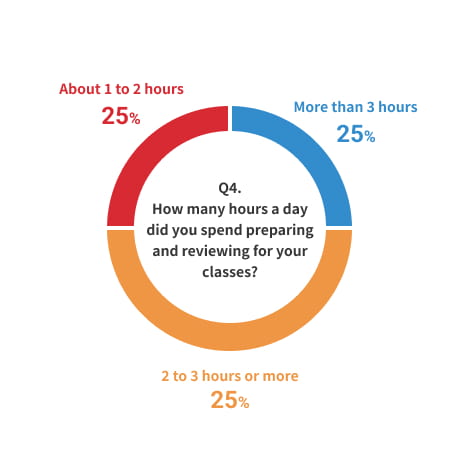
● Engineering ● ECU campus tour ● The engineering lab surprised me.Many of the research topics were new to me and I found them very advanced. ● I especially liked the environmental lab experience. Observing the research being conducted on aquatic plants at different temperatures in the water environment, I learned that research is also being conducted that could lead to solutions to major environmental problems. Also, the classroom used for experiments was equipped with many small monitors and speakers, enabling the professors to be heard throughout the classroom, making it easy for students to thoroughly understand the lectures. ● Biology and Chemistry ● School of Engineering ● Environmental Science lab experience ● Engineering Department lab tour
● Presentations to advance to the doctoral program ● All others: None in particular
● Yes ● Yes, to some extent. ● Yes, I was. ● The technical terms and other vocabulary were difficult, but I tried to interpret the explanations using other clues, which helped me to understand them. I was able to understand. ● I did not know some of the words, but I was able to understand them. ● Apart from the technical explanations, I was able to understand the experiments and the students’ curriculum. ● The explanations were a bit technical and difficult, but I generally understood them.
● It was fun, but I felt it was more of an introduction to the facility than a lab experience. ● It was nice as I was able to go around the lab. But, because many of the explanations were on mechanics, I felt that they were not relevant to our own research themes. For example, I felt uneasy about whether I would be able to advance my research in that regard if I were to move on to a new major at the graduate school at TCU, so I felt that I wanted to make a more careful decision. ● There are various kinds of laboratories at ECU, and I think each has its own characteristics. ● When I visited the engineering labs, I found it appealing that there were many places where you can use the latest technologies such as 3D printers, testing equipment for building structures, automatic manufacturing equipment, and repair technology, and that they offer more than 20 engineering courses. Through two lab experiences, one related to the environment and the other to engineering, I saw that they have many facilities that support students as they engage in research, and I felt they have a very good environment. I don’t get to visit labs like this very often, so it was a great experience. ● I visited a very fascinating lab. ● I was able to see how students were doing in the lab. I found it interesting to learn about various fields of engineering that I didn’t know about because I wasn’t originally interested in engineering. ● It was very kind of them to show us the facilities at ECU. I was able to see firsthand what kind of environment the local students are studying in. But I would have liked the opportunity to learn about some of the details of the research in addition to the explanations on how students spend their time and the facilities (detailed descriptions of posters posted on campus, etc.). ● There are a lot of labs that do a really wide range of research, and they are all on the Joondalup Campus, so I noted that it must be easy for students of different fields to work together.
● Seminar by a researcher from Indonesia. ● Seminars to introduce a day in the life of researchers and explain what they feel in their daily research ● I found it interesting to see a robot dog planting vegetation in the ocean in the engineering and environmental lab. ● The seminar on life as a Ph.D. was very informative.It was interesting to me because I had never thought about what life would be like, as I thought that pursuing a Ph.D. would still be a very long way off for me. ● Process science ● Getting started with your research, time management for HDR students ● Seminar on concepts and research ethics in conducting research as a doctoral (or master’s) student ● Seminar on how to allocate time
● All: None in particular
● Yes ● It depends on the person. One of the people who gave us explanations was a Perth native majoring in music, but I couldn’t understand it because of the content of the major and the accent. The other person was an immigrant, and what he said was relatively easy to understand. ● Yes, I was. ● It was difficult to understand the explanation about R. Because I had never used R before, it was difficult for me to understand the explanation in English while operating it. ●I was able to understand. ● Yes. ● Yes, I was. ● All of the graduate students spoke clearly and were easy to understand.
● They seemed to think we were postgraduates, so I felt there was a gap in the seminar content. ● It was a rare opportunity to listen to Ph.D. students. In particular, I was impressed by the explanation that in order to immerse oneself in research, it is necessary to refuse invitations to go out, and that getting a PhD is not the only thing in life. I think it was useful experience, but there were some issues. All SOAR sessions were extended by one hour.There was probably a discrepancy between what the doctor thought the session times were and what we were told.It was a problem because I had to inform my host family that I would be home later than planned. ● SOAR research is very useful, but it is designed for PhD students, so I think was a bit removed from what we were studying. ● It was helpful for me to learn the concepts and approaches necessary to continue conducting research for many years to come, such as time management, how to set goals, and how to stay motivated. ● The seminar was long, but I gained a lot of experience. ● The SOAR advisors explained things clearly and two of them gave interesting talks about their research.Each session seemed somewhat long. ● It was a wonderful opportunity to think about research and exchange with students studying different fields. However, there were some issues, such as miscommunication about when the session would end, and problems with the setup for the R session. ● I rarely get to talk to graduate students, so it was a valuable experience.The story of a graduate student who came to Australia from abroad and is studying at ECU was particularly interesting.However, I think all of the sessions were aimed at 4th year undergraduate and postgraduate students, so they weren’t very suitable for students like us who are in the first year or second year of undergraduate studies.
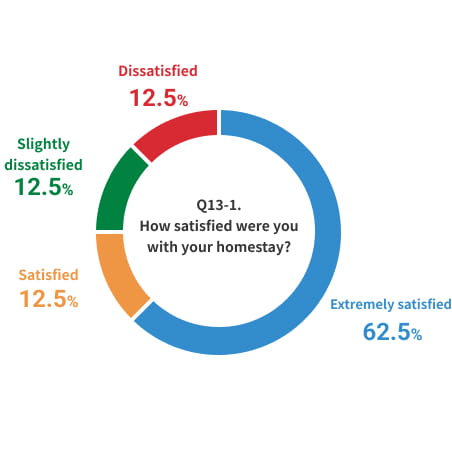
● My host family sometimes did not prepare meals for me. ● My host family were kind people.This may sound a bit harsh, but had I experienced problems with my host family, I would have chosen ‘unsatisfactory.’ ● The first host family’s house was far from the campus and could not provide three meals a day. I moved to another host family’s house, but my health suffered during the last two weeks because there were many substances to which I was allergic in the bedroom of the second house. ● The host mother was very kind and I appreciated that she made sandwiches for dinner and lunch every day while I was busy. The food was delicious and we had a lot of conversations. I was able to understand. ● I was able to establish a good relationship with the host mother.They shared their thoughts on careers and their views on Australian history. I had no problems in my day-to-day life, and my host family was very supportive when it came to my classes and studies. ● I was able to live without any inconveniences for the most part, and the family supported me with three meals a day. ● My host mother was the kindest host mother I have ever had while studying abroad.
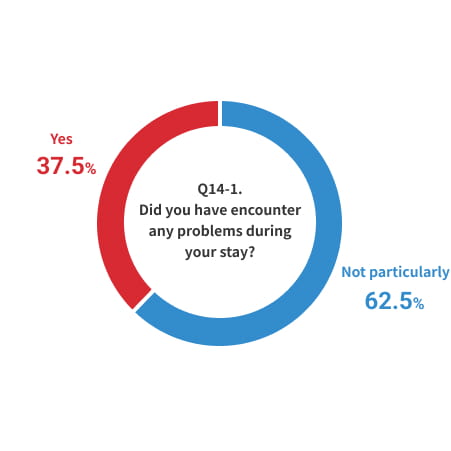
● Change of homestay family ● Due to ECU’s failure to issue me a Smart Rider (a card that doubles as a student ID card and transportation IC) on my first day, I was unable to successfully board the bus. Especially since I had just started studying abroad, there were many things I didn’t understand or hadn’t gotten used to, so it was very stressful. ((Looking back now, it was a minor issue, but it stressed me out mainly because it was a source of confusion on my first day of studying abroad.)) ● Rottnest Island, Pink Lake, Kalbarri National Park
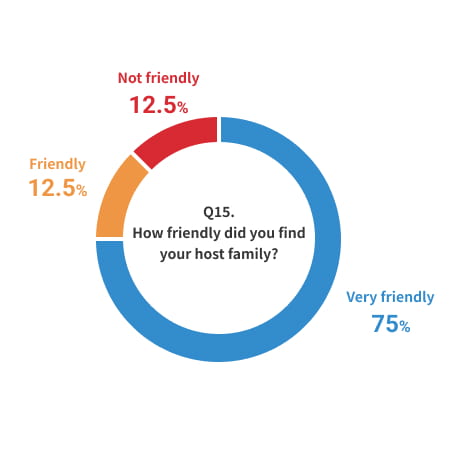
● I was told by those around me that I should not get involved with my host family, so I returned home late. ● I tried to speak to them as much as possible every day and to be polite. I felt it was important to follow the house rules and keep an appropriate distance. ● Eating on time, not eating in the bedroom, not buying snacks, etc. ● I tried to adjust my schedule according to theirs. Dinner was served at 6:30 p.m., so I tried to get home or finish other things by that time.Since my host mother and I had separate bedrooms on different floors, I made a conscious effort to increase our interactions, and we talked every day. I also made a conscious effort to always remember to say thank you and greet her. ● I changed the habits I had from living alone. ● I tried to express my gratitude in various ways. I offered to help with housework, or I watched and imitated how they do things. I made sure to speak to them or get permission before doing anything. I tried to keep the space I was provided clean and restore it to the way it was before I used it. I was careful about the way I spent my time to suit the lifestyle of my host family. I tried not to stay in my room longer than necessary. ● The host family mainly spoke in Chinese, and the parents had difficulty speaking English, so I spent my time there with little hope of improving my English skills. However, I used the Chinese I had learned from a Chinese exchange student at TCU and spoke to the son of my host family and other exchange students who could speak English, and I was able to get by. ● I tried not to stay secluded in my room too much. I also tried to do my homework in the living room, and communicated by asking my host family when I didn’t understand something.
● I greeted them and they ignored me. ● We sat around the table and talked about many things, and they took us swimming. ● My second host family had two dogs. I like playing with dogs. ● They drove me to Fremantle and we went around the market and ate fish and chips together. ● Chatting over dinner and going for a drive. ● Going on a picnic and a bike ride with my host mother.We talked about the books we read at dinner and different cultures. ● I went cycling with a neighbor who came to my host family as a tutor.Another good experience was when my host family took me to a Chinese temple in Perth. ● My host family took me to so many different places, and I had many opportunities to meet my host mother’s family members.
What did you think of your life at the homestay?8 responses ● It was very difficult, so I think it improved my resilience. ● I’m very satisfied. Because my host family was kind, they supported my life to the fullest, and I was able to improve my English.However, I think that this is largely because my host family happened to be good people. I would recommend that students at the new major course live in a dormitory. ● I got used to spending time with a host family using English, but I would have preferred a better living environment. ● Living with my host family, I was able to not only improve my English, but also learn how to live my life and different ways of thinking. It was a very meaningful time. ● It was a moving and impactful time. ● It was a very nice experience. ● I did not have the opportunity to speak English all the time, but my host family was very kind to me, and I feel that it was a valuable experience. I was able to develop skills that I could not cultivate in my life before then. ● There’s no way to know how your host family will be until you actually meet them.My host family was very kind, but I heard from some seniors who said their host families didn’t even offer meals (though the rules say that they must serve three meals every day), or that they didn’t even respond to the student when they greeted them. If I had paid for such a homestay, I would have had a hard time.
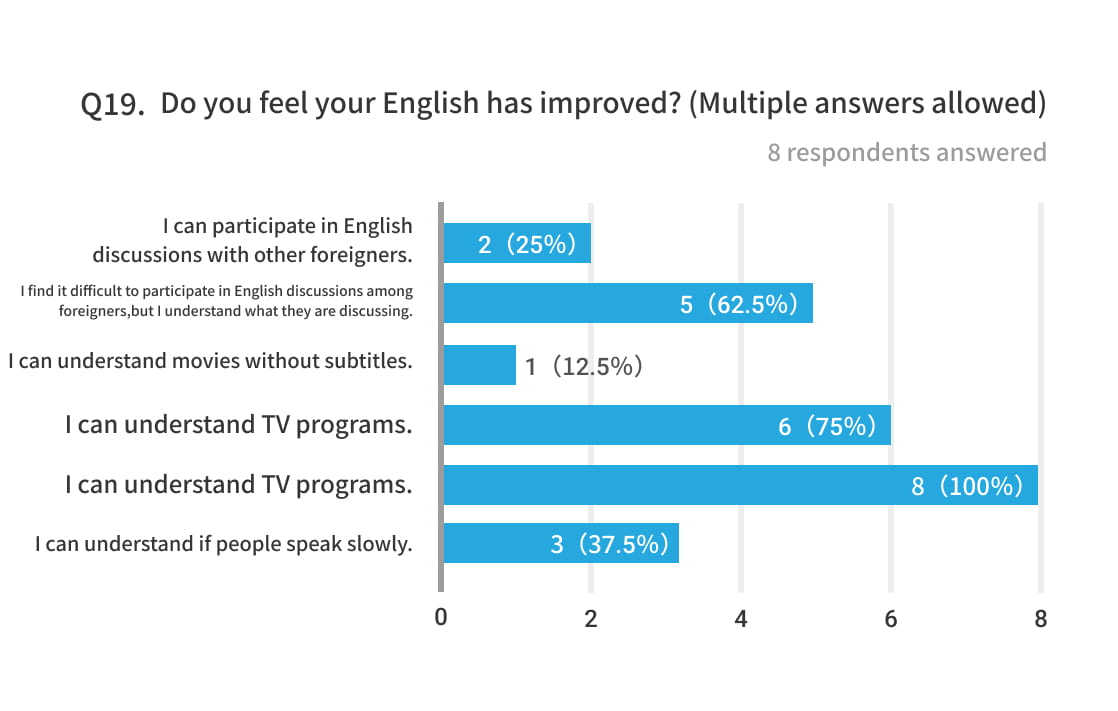
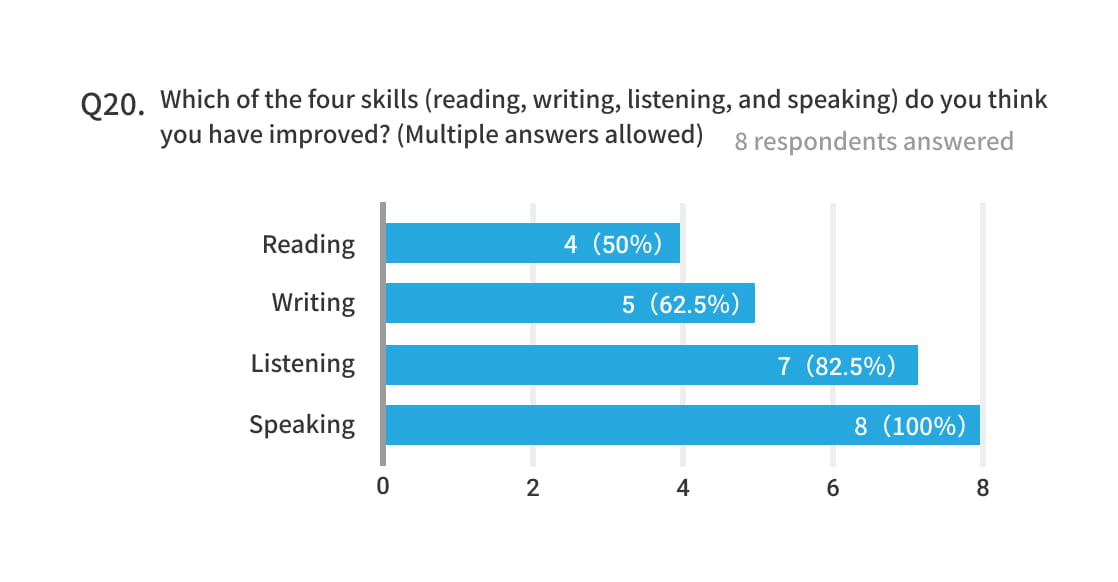
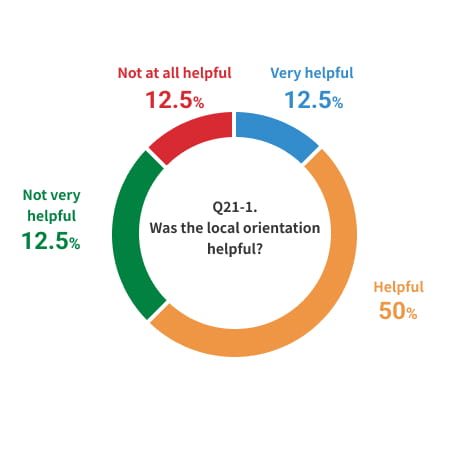
● There were some activities that I felt would be more efficient if I organized them myself. The talk about protecting myself from crime was helpful, but I would have been happier if my host family had provided more practical explanations, such as how to ride the bus or how to get a Smart Rider. ● I didn’t participate. ● Because of my homestay, I used the bus before learning how to use public transportation at the orientation. I was anxious because I wasn’t able to use the bus very smoothly, so I was glad to hear the explanation later. ● It helped me to get used to the life there quickly. ● I was not sure how much of the explanation about the program was meant for us. The orientation about the rip currents and the beach was very clear and helpful. ● They provided information necessary for living in Perth. ● It was mostly for TAP students.
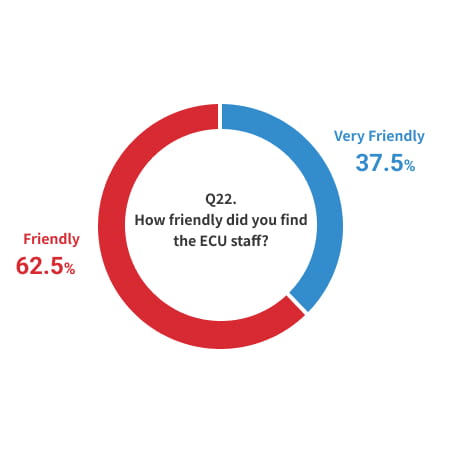
● None ● They always responded kindly with a smile. ● The teachers and staff were kind and gave me a lot of advice and help. ● I didn’t interact with them much, but I felt reassured because they were always looking out for all of us. Also, we had to register our student cards and set passwords by ourselves, so they helped us when we had questions. ● I am grateful for them. ● I am grateful to them for their kind and detailed explanations. ● It took a bit of time to have my student ID card issued, but thanks to all the staff at ECU, I received it without issues. ● There were many cheerful teachers and staff.
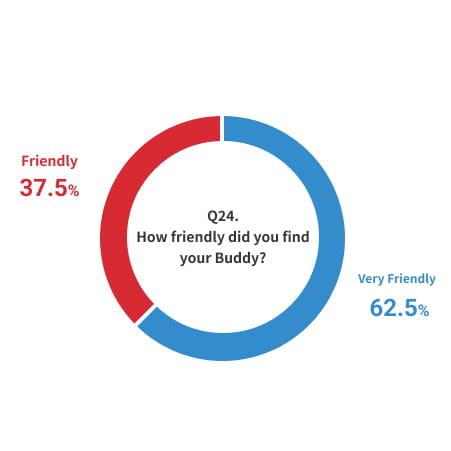
● I enjoyed going to Fremantle. ● My Buddy was very kind and kept in close contact with me. I also saw someone consult their Buddy when they were in trouble. ● None in particular ● Despite how busy he was, my buddy Addie made various weekend plans for us, which allowed me to visit many places. Addie is funny and has a wonderful smile, so I’m glad I was able to take many pictures of her laughing as we went around the aquarium together. She also recommended spots and shops and shared them with me on LINE, allowing me to enjoy those places. ● The present I received was very cute, and I would like to see my Buddy in Japan if I have a chance. ● My Buddy took me to the aquarium, the beach, and tourist attractions, which made my life in Perth very fulfilling. I also received a gift on the last day, and I am very grateful. ● It must have been a lot of work for my Buddy because he had to contact many students and plan and lead various recreational activities.
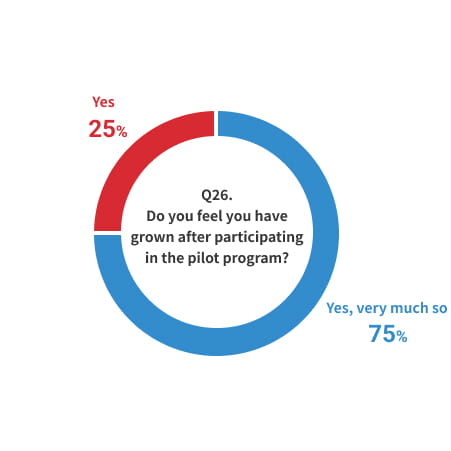
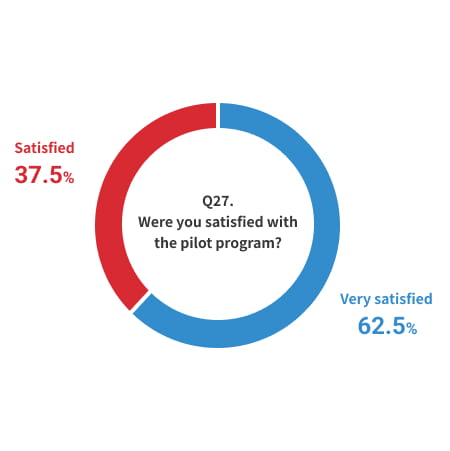
● The ECU people thought we were postgraduates, and there were people who didn’t know we were there at the initial flight and orientation (like JTB staff). I didn’t think the program was well organized. ● I thought it would be good if the exact schedule, content, and destination for each event were shared in advance. Also, through the pilot program, I could not imagine myself making progress on my own research topic while belonging to the newly established graduate course. I thought that if the pilot program was actually in the form of a demonstration of what a day’s classes would be like if I were affiliated with the newly established graduate course, I would have an easier time visualizing my graduate studies. ● As it was a master’s program, I think I would take more specialized classes in addition to the English classes. It’s hard to take classes every day, so I would have liked the classes to be better coordinated.Also, I would have liked my host family to make reasonable arrangements. ● It may be due to the time of year, but since all the students in the class were Japanese, I wished I could have talked to students from other countries. ● I think I would learn more if more specialized classes were offered. ● In terms of English ability, I felt that it was difficult to stay motivated to improve my language skills because I spent most of the day in contact with Japanese people, especially with TCU students that were easy to talk to, and I sometimes heard similar comments from other students in the class. I heard that we were required to stay at a host family’s house because there were no vacancies in the dormitory, but I found the homestay experience to be very valuable. ● There was very little information at the time of departure, and I was very worried about the procedure for the flight.Also, it would have been helpful to have been informed of the class and SOAR schedule a little earlier.Some students encountered problems with their homestay families, so I feel that in the future it would be preferable for students to stay in a student dormitory.Given that the theme of this major is “a decarbonized society,” I believe that the program would be better if we had the opportunity to learn a little more about the specialized content of the program. ● The program would be better if it included a little more content for first and second year undergraduates.
● To prioritize my health ● I thought it as an opportunity for daily growth and challenged myself in everything I did.So, I made sure to get plenty of sleep and exercise.One specific challenge was to talk and communicate with people in English no matter what. ● Useful communication ● I made it a point to ask questions about things that I did not understand. When I went to restaurants, if I was unsure about an option, I would ask the waitstaff about the options or ask for their recommendations. Also, when I went to see the architecture of Saint Mary’s Cathedral by myself, I didn’t know whether I should take photos, so I asked a security guard. He gave me permission to take photos, and after that, we talked a lot about Japan. I think that by not shying away and asking people questions, I was able to have a more fulfilling experience than if I had not asked anything. ● I interacted with foreigners a lot. ● I interacted with my Buddy and other members of the same pilot program. ● I made it a point to go to bed early and get up early, and to put my health first. ● I made it a point to communicate actively.
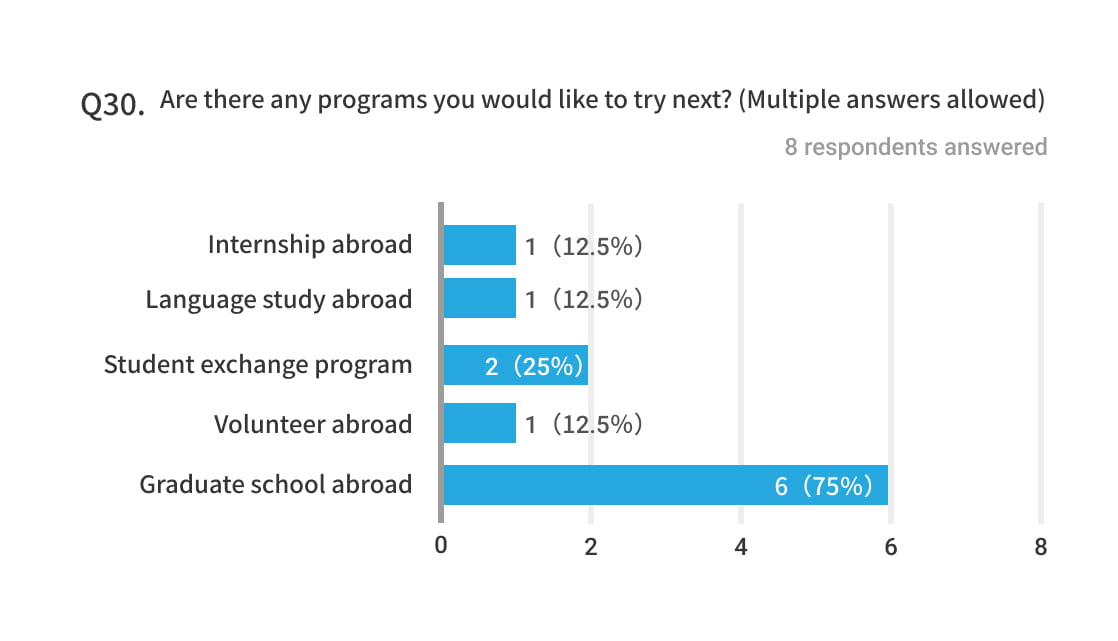
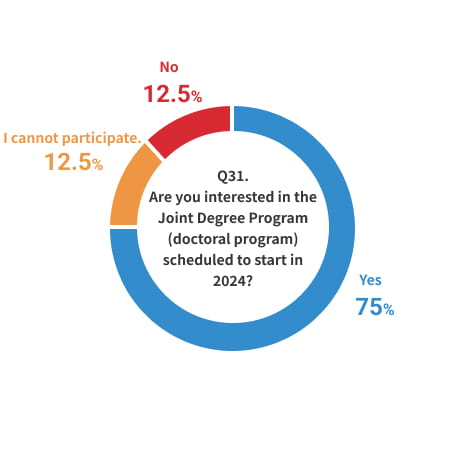
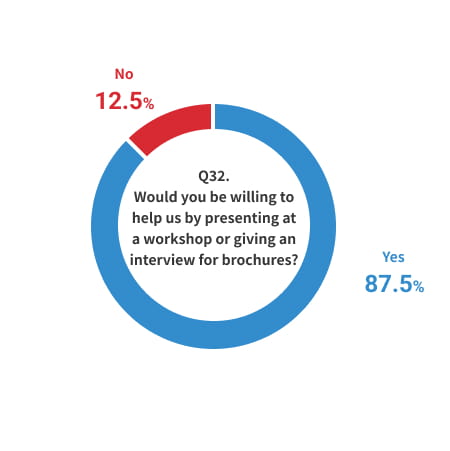
● I’m very grateful. I was the only one who was not from the Faculty of Environmental Studies, so I had a lot of anxiety, but I was blessed with friends and managed to make it through. I am studying at the Faculty of Science and Engineering, and before joining the program, I was not very interested in the environment, but now I would like to become an environmentally conscious engineer.Thank you very much for providing me with this valuable experience. I look forward to many more experiences ahead. ● (* If you answered “yes” to Q32, we will ask you to help us by giving a presentation at the workshop if you have time in your schedule.) Through this program, I think my resilience has increased, not to mention my English skills. In the future, I will do my best in my English exams and my research so that I can be more confident when I say how much this program helped me. Thank you very much for this precious opportunity. ● Thank you to the university for this opportunity. I hope the project gets better and better! ● As this was my first time studying abroad, I was able to learn new English words and phrases. Moreover, it was a big step for me to gain confidence in my ability to communicate with others using my own English. Through seminars and lab tours, I was able to learn a lot about graduate school. Also, the other seven members were kind and interesting, so I had a very enjoyable time. Through this study abroad program, I was reminded of my weaknesses when it comes to English, so I will strive to continue studying the language. Thank you very much. ● I learned a lot in these two months. Thank you very much for this opportunity. ● The program provided me with unexpected opportunities and a valuable experience.Thank you very much. ● I strongly feel that this program has given me an opportunity not only to improve my English but also to broaden my horizons. I gave up participating in TUCP due to the COVID-19 pandemic, so I am very honored to have had this opportunity. I have decided to go on to graduate school. I realize that being able to study abroad during this period before I get a job or do my fourth year of research will definitely benefit me. I will continue to work hard to engage in research from an international perspective. Thank you very much for this precious opportunity. ● I’m glad that I was able to have such a valuable experience!Thank you very much.










